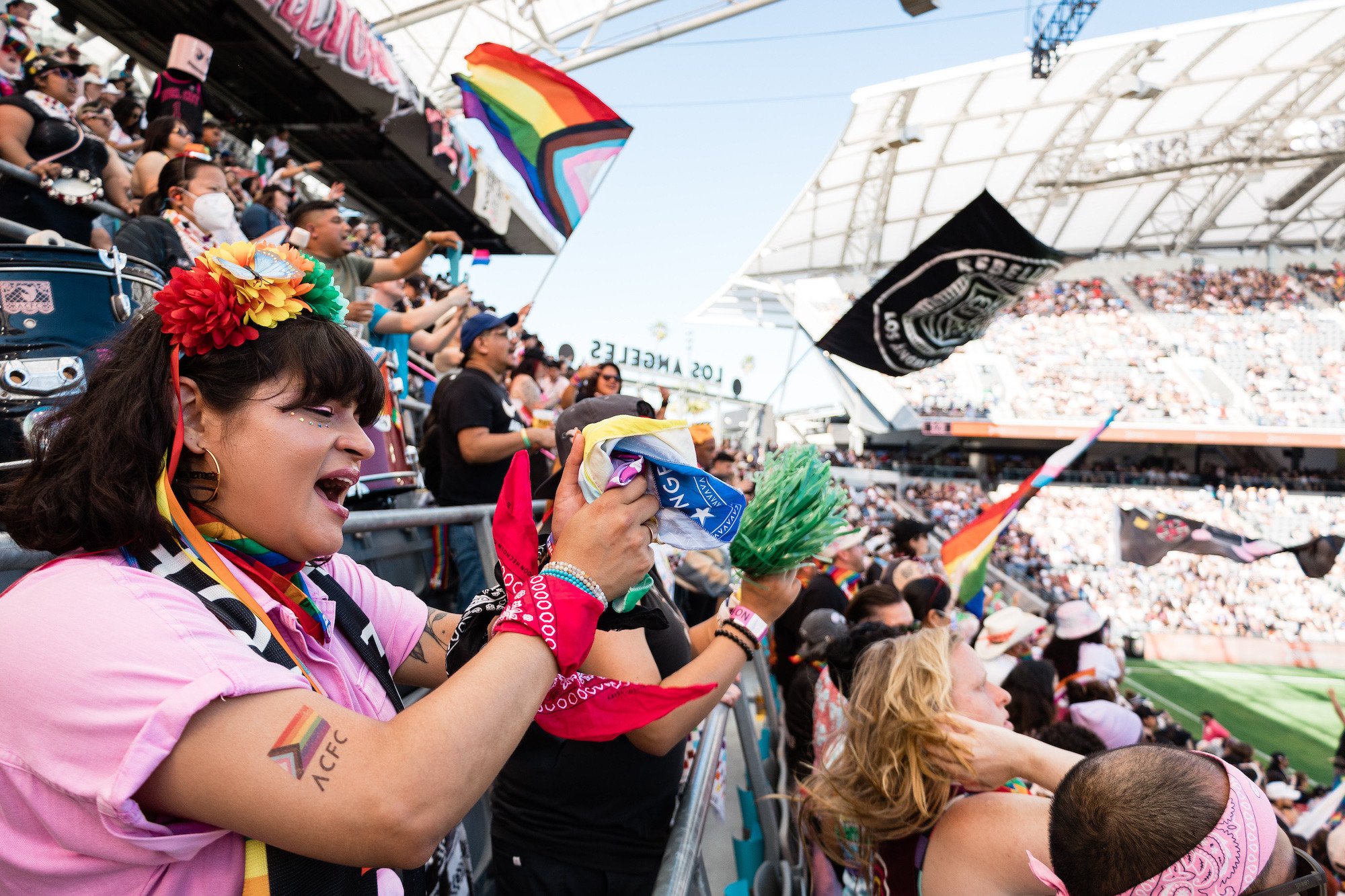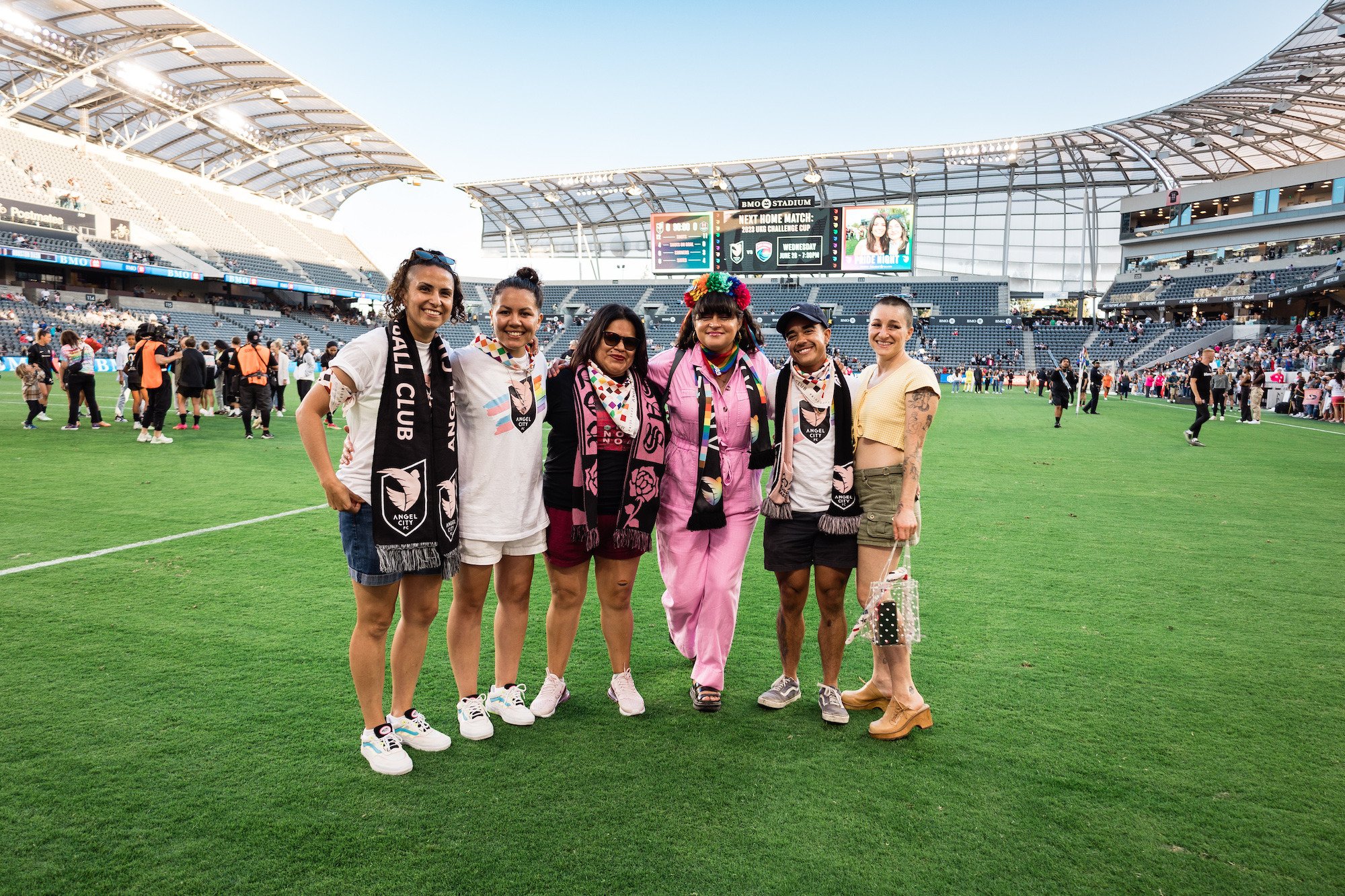ACFC26_JERSEY-LAUNCH_HERO-STATIC-SUSTAIN_FLARE-KIT_16x9.webp?width=520&height=294&name=(V1-SAVY+GISELE)ACFC26_JERSEY-LAUNCH_HERO-STATIC-SUSTAIN_FLARE-KIT_16x9.webp)

For many in Angel City’s queer community, including the three fans featured in Angel City's Pride Stories series, their club is a place of connection, belonging, and joyful defiance of repressive gender norms.
That sense of belonging would have been hard to imagine even 15 years ago. Participating in sports, whether as an athlete or a fan, has long been a fraught proposition for people in the LGBTQ+ community. Sport is a space where gender norms are strictly enforced, and deviating from those norms in any direction can have consequences.
On one end of the spectrum, men’s sports are used both to test and enforce masculinity, and queerness is still largely taboo, with just a handful of queer-identifying athletes having participated in the major men’s sports leagues.
In women’s sports, on the other hand, athletes were long told that to gain acceptance and support, just competing wasn’t enough—they also had to fit audiences’ ideas of how girls and women are supposed to look and act. Even as women’s sports have become a safe haven for queer women, competitors whose physical build or gender presentation don’t fit traditional ideas of girl- or womanhood are still subject to suspicion and outright exclusion.
Trans women and girls face the biggest hurdles of all, with a flood of recent legislation in states across the country aimed at limiting or banning their participation in women’s sports.
Despite those difficulties, however, sport can also be a home for queer people, a space where we can find community, be ourselves, and feel at home in our bodies.
Salem (they/them)
Salem Martinez is a nonbinary transmasculine graduate student and athlete who played D1 women’s soccer at UC Riverside and now competes in Olympic weightlifting. They have been openly queer since high school, but didn’t come out as trans until the spring of 2022—around the same time Angel City entered the NWSL.
For Martinez, sport has always been a space where they feel grounded in their body. As a kid, “soccer was a place where I learned to take up a lot of space and to not feel bad about that,” they say. “You should take a lot of space. Especially in soccer, you need to be loud, you need to be big. It's not helpful to be meek.”
After soccer, Martinez took up weightlifting, and as they navigated dysphoria and came to accept their trans identity, their training was a refuge. “At the gym, gender just kind of dissolves in a way,” they explain. “When you're physically doing it, there’s an embodiment to that.
“The experience of being trans is so much about feeling disconnected from your body, right?” they continue. “[Sport is] a way to reinscribe or remember what it means to exist in your body or feel comfortable there, where dysphoria by its nature is feeling completely the opposite of that.”
When Martinez stepped away from soccer after college, they thought they’d never be back. Despite their love for the sport, years of competing at a high level had taken a psychological toll and sucked much of the joy out of the game. “At some point it starts to seem like a toxic relationship of sorts,” they say. “I didn't want anything to do with soccer. I didn’t want to watch it. I didn't want to be involved in it. People would ask if I wanted to play casually and I’d say, ‘Absolutely not. That sounds terrible.’”
Weightlifting helped with what Martinez describes as “a lot of repairing I had to do around my relationship to exercise.” But they still weren’t interested in returning to soccer itself.
One day, a professor from Martinez’s dissertation committee who had bought ACFC season tickets invited them to a game.
“I remember walking out of the tunnel and seeing the field, and I cried,” they remember. “It was just like, ‘oh, that's right. This is what I did for 20 years. This is why I loved it so much.’”
Being a fan gives them a new perspective on the game—and they’re still marveling at how far the women’s game has come. “I get to enjoy it now ] in a way that I was never able to as a kid,” they say. “There was not this visibility of women's soccer. We got the World Cup and the Olympics, if you could even find it on TV. And now every other weekend I get to come to games.”
They also say the energy at Angel City games is different from every other sporting event they’ve been to. “It doesn't have that hypermasculine, cis-straight atmosphere. It's very nurturing. It’s helped me heal and re-enter the soccer world that I kind of resented for a long time. And I got to enter it as a really different version of myself.”

From left to right: Javiera Guajardo, Francisca Mella, Daisy Chávez-Mendez, Anabel Martinez, Salem Martinez, and Salem's partner, Zev Woolley. Photo by Gabrielle Scharaga.
Javiera (she/her)
Javiera Guajardo is a former member of the Chilean women’s national team who currently lives in the LA area, where she coaches with Football for Her and Girls Play LA and continues to play.
She and her partner of 11 years, Francisca Mella, met while playing futsal in Chile when Guajardo was in university and Mella was just leaving high school. “There was one day in the summer where the team was going to go swimming, and she got there first,” Guajardo remembers. “We didn’t know each other, but when I found out she was there alone, I was like, ‘well, I’m not going to leave her there by herself,’ so I went. And we ended up staying there and talking all night.”
In Chile, Guajardo says, being gay was something she never felt quite comfortable being open about. In the community she’s built here in LA, it’s a different story. “I feel safe, protected, supported,” she says. “Which I never felt in Chile. I think that’s super important. The LGBTQ+ community isn’t just people who are gay, lesbian, or trans. It’s bigger than that. It’s people who understand that love is love, no matter who you choose to be with.”
“I’m really proud to be part of [the queer community] here,” she says. “I feel welcome here. I can truly say that I’m proud to be a lesbian and it’s not a problem for me to say that publicly or on social media. That wasn’t easy, actually—when I first got here, I didn’t post anything about [Francisca and me], but eventually I thought, ‘why not?’ And after that, it was no big deal.”
Anabel (she/her)
Anabel Martinez is a member of Angel City supporters group Poderosas. She didn’t wasn’t a big soccer fan before ACFC, but her spouse was a serious player growing up and bought season tickets for the two of them as soon as they became available in 2021. The couple’s friend, Daisy Chávez-Mendez, asked if they wanted to be part of a new Latina-led SG she was co-founding.
“Ever since then,” says Martinez, “We’ve been out there. Since day one of Challenge Cup [in 2022] out in Fullerton.”
Martinez’s dad is a soccer fan, so she grew up with the sport to an extent. However, she says “it kind of didn’t feel safe for me because I felt like there was such a strong energy, like it was too aggressive.”
Poderosas, she says, tries to cultivate “passion without aggression.”
Being a supporter, says Martinez, is about being there for the team all game, every game, win or lose. “They're going 90, so we need to go 90,” she says. “This whole community is happening because there's a team.”
Martinez says Poderosas almost accidentally became a safe haven for the queer community, especially queer Latinx people. “I feel like every time we bring people who have gone to men’s games, to MLS matches, and they come to a ACFC match, it's such a different feeling in terms of acceptance, and just embracing your queerness, and how out and proud we are.”
She says that while men’s sports teams might have a Pride night or an LGBTQ+-centric supporters group, queer Angel City fans are celebrated at every game. She explains that queer Poderosas members used to take a group photo at each game, “but then we realized that we're just queer everywhere, all around the stadium. So we stopped because every picture that we take includes so much queer community.”
That space is especially crucial right now, as LGBTQ+ people are under attack by right-wing reactionaries across the country. “Even though we live in LA, which is supposed to be a somewhat more liberal space, we have seen people protesting school board meetings because they wanted to be inclusive of LGBTQ folks,” Martinez says. “So I think it just means so much more to be able to go into a space where I feel I can fully be myself and my team accepts us and welcomes us.”



.png?width=520&height=294&name=IMG_2277%20(1).png)


